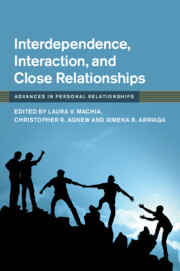Book contents
- Interdependence, Interaction, and Close Relationships
- Advances in Personal Relationships
- Interdependence, Interaction, and Close Relationships
- Copyright page
- Contents
- Figures
- Tables
- Contributors
- Acknowledgments
- Introduction
- Part I Interdependence, Situations, and Context
- Part II Interdependence, Security, and Risk
- Part III Interdependence, Goal Pursuit, and Person Factors
- 9 Autonomous Interdependence
- 10 Pursuing Interpersonal Value
- 11 Advances in Self-Expansion
- 12 Self-Esteem, Negative Expressivity, and Partner Responsiveness
- Part IV Interdependence, Timing, and Expectations
- Index
- References
11 - Advances in Self-Expansion
from Part III - Interdependence, Goal Pursuit, and Person Factors
Published online by Cambridge University Press: 19 June 2020
- Interdependence, Interaction, and Close Relationships
- Advances in Personal Relationships
- Interdependence, Interaction, and Close Relationships
- Copyright page
- Contents
- Figures
- Tables
- Contributors
- Acknowledgments
- Introduction
- Part I Interdependence, Situations, and Context
- Part II Interdependence, Security, and Risk
- Part III Interdependence, Goal Pursuit, and Person Factors
- 9 Autonomous Interdependence
- 10 Pursuing Interpersonal Value
- 11 Advances in Self-Expansion
- 12 Self-Esteem, Negative Expressivity, and Partner Responsiveness
- Part IV Interdependence, Timing, and Expectations
- Index
- References
Summary
In this chapter, we discuss recent empirical and theoretical advances that demonstrate how, why, and under what conditions interdependent relationships promote self-expansion (i.e., the cognitive reorganization of individuals’ self-concept due to the acquisition or augmentation of traits, perspectives, identities, and capabilities). In particular, we discuss ways in which engaging in self-expansion has the potential to not only enhance individual well-being but to also enhance close relationships. In the first section of the chapter, we review the broadening and deepening of research on the fundamental tenets of the self-expansion model. Specifically, we begin by identifying the defining characteristics of the self-expansion process, such as the underlying features of shared relational activities that foster self-expansion. We then explore cognitive and motivational antecedents of self-expansion seeking, particularly experiences that promote approach motivation and subsequent interdependence. Furthermore, we discuss the relational, behavioral, cognitive, affective, and physiological outcomes of the self-expansion process, and we consider how the outcomes of both relational and individual self-expansion shape expectations for relationships. In the second section of the chapter, we review interdependence-based extensions and applications of the self-expansion model. Specifically, we discuss additional self-concept changes that interdependent relationships can foster, including cognitive reorganizations that have deleterious intra- and interpersonal consequences. Additionally, we examine how self-expansion can occur in myriad contexts (e.g., through individual experiences, romantic relationships, friendships, the workplace, and intergroup interactions), and we explore novel applications and implications of self-expansion, such as reducing relationship conflict and intergroup prejudice. Finally, using the recent research in self-expansion as context, we discuss potential directions for future research.
Keywords
- Type
- Chapter
- Information
- Interdependence, Interaction, and Close Relationships , pp. 225 - 245Publisher: Cambridge University PressPrint publication year: 2020
References
- 2
- Cited by

